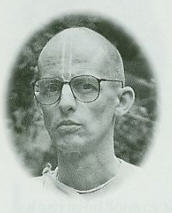
Satsvarupa Dasa Goswami
THOUGH THE Srimad-Bhagavatam assures us that if we inquire into the Absolute Truth we will not suffer repeated birth and death, it does not guarantee that in this life we will be immune to all suffering. TheBhagavatam tells of many great devotees who suffered. Prahlada Maharaja was tortured by his father. Narada Muni's mother died when he was only five years old. Queen Kunti suffered continually as she wandered in exile with her five sons. Devaki and Vasudeva saw their first six children murdered by Kamsa. Even Srila Prabhupada seemed to suffer as he sustained two heart attacks aboard the Jaladuta and faced untold difficulties in his preaching.
When a disciple asked Prabhupada why the devotee suffers, Prabhupada said that whenever a devotee suffers he can take solace in knowing that he is suffering for the last time: by tolerating the suffering, he is becoming detached from the body and eligible to return to the spiritual world.
Other devotees pressed the point over the years: But why does a pure devotee suffer? Srila Prabhupada often didn't answer that question directly except to assure us that our suffering and that of pure devotees is not the same. The pure devotee appears to suffer, but because he never forgets Krsna and depends upon Him in all circumstances, he is always in transcendental bliss. Life in this world is discordant, bittersweet. In the absolute world, bitter and sweet do not conflict, because Krsna is behind everything.
Since we are still striving to attain constant remembrance of Krsna, our suffering, unlike the pure devotee's, is not absolute but is meant to drive us toward submission and dependence on the Lord. Therefore, Srila Prabhupada challenged us not to approach Krsna to have our suffering reduced. Devotional service is not an antidote for pain. Those who look to Krsna to free them from pain are salvationists. We are interested in service and surrender. Suffering strips away our material attachments. It lets us see our bodies, families, homes, and world for what they are. We are suffering because we have been born in the material world. We are born and then we die. At death, our identity and accumulated possessions are ruthlessly ripped from us and we are forced into another womb.
This suffering is so horrible and all-encompassing that the Bhagavatam frequently reminds us of the cure: we simply have to inquire into the Absolute Truth. "Only by making such inquiries in this world can one be successful and perfectly cognizant, for such inquiries invoke transcendental ecstatic love unto the Personality of Godhead, who is the proprietor of all the universes, and guarantee cent per cent immunity from the dreadful repetition of birth and death." (Srimad-Bhagavatam 1.3.39) Inquiry into the Absolute Truth is simple. If we ask the pure devotee who is God, he will show us Krsna. If we are sincere, we will follow up that first question with a second: "How can I serve Krsna?" These two inquiries can invoke our dormant love for God and free us from all suffering. Inquiry implies that we are curious and eager to know Krsna. The more we study Krsna's qualities and pastimes, the more we will come to love Him and feel dependent upon Him. The more dependent we become, the less bothered we will be by our material suffering. As Lord Siva tells his wife in the Eighth Canto of the Srimad-Bhagavatam, "Certainly it is the duty of the master to protect his suffering dependents." A devotee doesn't waste time trying to avoid suffering. Srila Prabhupada compared the material world to an ocean. The water froths and foams, and although bubbles come together for a few moments, they are dispersed just as suddenly by the next wave. Everything in the material world is temporary. We are here today complete with our happiness and pain and gone tomorrow. Only questions about the Personality of Godhead can soothe us and grant us liberation. What more could we want?
Satsvarupa Dasa Goswami travels extensively to speak and write about Krsna consciousness. He is the author of many books, including a six-volume biography of Srila Prabhupada.
